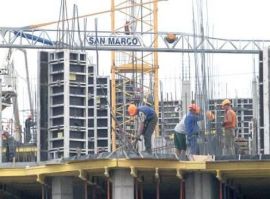Construction, EU – Baltic States, Investments, Latvia, Legislation, Real Estate
International Internet Magazine. Baltic States news & analytics
Thursday, 18.12.2025, 19:54
After prolonged idleness the attempts to change construction regulations in Latvia have been successful
 Print version
Print version |
|---|
Homburg Management, a Canadian-Dutch joint venture that operates in the Baltics, encountered a major setback as a result of the chaotic regulation climate when, in the autumn of 2012, its construction of a new supermarket in Latvia’s capital Riga was suspended. A legally issued and approved construction permit signed by the City Council of Riga, was disputed by a few local residents who submitted unfounded, even absurd complaints and were completely resistant to any discussions that could lead to a mutually beneficial resolution. However, as a responsible real estate developer, the company held a public discussion with local residents even though it was not obliged to under the law. By addressing their concerns, the company came to an agreement with all of the local residents with the exception of three inhabitants of nearby buildings who would not explain what they wanted, refused to communicate with representatives of “Homburg Management” and who could otherwise not be appeased, informed BC the press service of Homburg Management.
These residents initiated legal proceedings by submitting a plea to the court to annul the issued construction permit, however, in the middle of the process understood that was a lost cause for them and withdrew the plea. Nevertheless, operations of the company have been delayed by that period of time.
James Torpey, member of the board of Homburg Management, was astonished that it “was possible to have a legally issued building permit held for ransom by a frivolous claim or claims for up to one year after its issuance.” Mr. Torpey added that it is simply not possible to experience such a situation in any of the many countries his group is investing in.
It became apparent that the only way for Mr. Torpey to protect significant future investments the company had planned for Latvia, was to gather support to reform the law. So, at the end of the last year Mr. Torpey started to approach politicians, decision makers and other stakeholders such as social groups to explain how such abuse of the law was not possible in any other developed countries and to suggest a solution. Those approached included the Prime Minister of Latvia, the Chairman of the Economic, Agricultural, Environmental and Regional Policy Committee of the Parliament, experts of the Ministry of Economics, etc. – all of whom expressed their understanding of the inherent unfairness of the construction permit regulations. Nevertheless, despite the efforts to explain the benefits to the country as a whole of reaching a solution to avoid this problem in future, there was resistance from many to make any changes to the current law for various reasons.
After intensive and time-consuming efforts to engage the support of top business leaders, public associations and social groups, on the 18th of April, the Parliament of Latvia approved changes to the current Construction law. This change significantly shortens the time frame during which it is possible to dispute a construction permit and limits the possibilities to demand its suspension – an issue that until now created considerable losses for both the investment and construction sectors.
Mr. Torpey said: “I am very pleased that the decision makers of Latvia finally heard the voice of reason and that an effort was made to solve a problem which negatively impacted the economy of Latvia. I have to admit that while these changes are not ideal, it is definitely a step in the right direction for the protection of both foreign and domestic investment into real estate.”
It has to be noted that the Parliament of Latvia is currently working on the development of the new Construction law, which has been in the making for the past six years, Mr. Torpey hopes that all of the issues that are yet to be solved will be solved in the new Construction law.








 «The Baltic Course» Is Sold and Stays in Business!
«The Baltic Course» Is Sold and Stays in Business!

